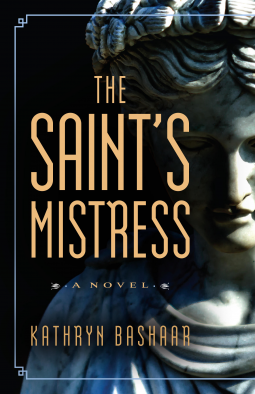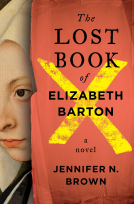
The Saint's Mistress
by Kathryn Bashaar
This title was previously available on NetGalley and is now archived.
Send NetGalley books directly to your Kindle or Kindle app
1
To read on a Kindle or Kindle app, please add kindle@netgalley.com as an approved email address to receive files in your Amazon account. Click here for step-by-step instructions.
2
Also find your Kindle email address within your Amazon account, and enter it here.
Pub Date Sep 22 2020 | Archive Date Sep 28 2020
CamCat Publishing | CamCat Books
Talking about this book? Use #TheSaintsMistress #NetGalley. More hashtag tips!
Description
Told against the fourth-century backdrop of the fall of the Roman Empire and the rise of Christianity, The Saint’s Mistress breathes life into the previously untold story of Saint Augustine and his mistress.
Defying social norms and traditions, the love between the Roman aristocrat Aurelius Augustinus and Leona, a North African peasant, creates a rift with his mother Monnica, his powerful patron Urbanus, and the Empire itself. When Monnica and Urbanus succeed in separating Leona from her son and securing a more suitable fiancée for Aurelius, Leona commits herself to the Church.
When many years later Leona and Aurelius, now Bishop Augustine, meet again, old passions re-ignite, perennial feuds smolder, and the fate of the Roman Empire in North Africa hangs in the balance.
A Note From the Publisher
Marketing Plan
Contact us: laura@camcatpublishing.com
Contact us: laura@camcatpublishing.com
Available Editions
| EDITION | Other Format |
| ISBN | 9780744301069 |
| PRICE | $14.99 (USD) |
Average rating from 15 members
Featured Reviews
Saint Augustine’s writings influenced the development of Western philosophy and Western Christianity. But before he became the bishop of Hippo Regius, North Africa, as a young man he fell in love with a peasant girl. And as a man of aristocratic blood, together they defied social norms and traditions.
Thagaste, North Africa, 371 AD. Leona, a goat shepherd’s daughter, helps at weaver’s shop. She catches an eye of Aurelius Augustine. At seventeen-years-old, he looks for students to practice his skills. He offers to teach Leona read. But this goes beyond teaching; their attraction to each other is mutual. When she gets pregnant, Aurelius is about to leave for Carthage to study rhetoric there. Defying norms as he is from a noble class and can't marry a peasant by Roman law or he'd have to forfeit all of his property. And with a help of a wealthy patron, they make Carthage their home for the next few years.
With the Roman Empire losing its grip in North Africa and the rise of Christianity, Augustine remains steadfast in Manichean believes. He refuses to join Christianity as some do to advance their careers. He wants to stay true to who he is. But life tests him and opens his eyes to rather heretical believes.
I enjoyed both characters very much. Aurelius’ excitement for philosophy and people who think is contagious. And he makes a mark as a charismatic orator. Leona is very rational and she is the voice for the poor. She fights for them to be fed when hunger strikes. She is a true example of what Christianity means: feeding a hungry person, comforting a distressed one, and caring for a sick one.
The time period is originally presented. It feels very real to experience the slipping power of the Roman Empire and the fear of people who are left to fend for themselves against savage tribes. The hardship of everyday life is well-felt and what the spreading Christianity brings is a balm for this kind of life. You can also feel the intense African heat and the warmness still radiating from the cobbled streets at the end of the day.
Superbly written. I was engrossed from the very beginning to the very end, with engaging and fully-developed characters offering a glimpse of their lives against the fourth century North African backdrop.
A Sinful Love Affair
The Saint’s Mistress is unique as far as historical fiction goes, focusing on the ancient Roman Empire, around the time that it was beginning to crumble and fail. It is a love story, but also a story of finding faith, and fulfilling one’s purpose in life, even if it means giving up what seems most important. The story is based loosely on the life of Saint Augustine (Aurelius), and his mistress, Leona. It is historical fact that Aurelius converted to Christianity in later adulthood, and that he had a wife, and a son. For the purposes of The Saint’s Mistress, Aurelius’ wife was a peasant girl named Leona, and therefore she could not formally be wed to him, making her a mistress at best, and their son a bastard at worst.Women in ancient Rome facts: education, marriage, motherhood and rights - HistoryExtra
Leona and Aurelius fall in love while he is teaching her to read and write– something that would have been unheard of in the Roman Empire; young women of the peasant class had no reason to be literate. But, it is Leona’s thirst for knowledge, her desire to better herself despite social expectations, and her quick wit that endear her to Aurelius. The conflict in the plot of the story comes from Leona’s desire to convince Aurelius to defy the laws of the Empire by marrying her despite their different social classes. Instead, she becomes his mistress, raising their son alongside him, and moving to exotic locations like Carthage and Milan. But overlaying their otherwise happy life, is the constant threat of Aurelius’ mother, and his patron, forcing a lucrative marriage on him, which would force Leona aside and restrict her ability to see their son.
My sobs stopped and I sat very still. How could both be true at the same time? How could unendurable sorrow exist beside God’s steadfast love? And the answer came to me: how could they not be true?…The steadfast love of the Lord never ceases. To prove it, he gives us each other to care for. — Leona
The Saint’s Mistress follows Aurelius and Leona across the Roman Empire, and across their entire adult lives, ending with the historically accurate death of Aurelius in the city of Hippo during the Vandal’s siege of the city. The story has many poignant, heart rending moments– life in the Roman Empire was neither easy, nor simple. But it is through the hardship that Leona and Aurelius each discover faith, and become the leaders they were meant to be, even though they have to walk their paths to greatness alone.
History is silent on the identity of Saint Augustine’s mistress (or the wife of his heart, as he calls Leona), but I like to think that this tale could be accurate. Although Leona’s life is not always happy, nor even what she might have dreamed of, it is a fulfilling one. She would have lived the type of life that would have illuminated the path to faith, and higher education, for many women to come after her in history. The Saint’s Mistress is a beautiful, fast paced, historical romance, with a little bit of “literary epic-ness” thrown in for good measure; in short, I would definitely recommend this book!


















